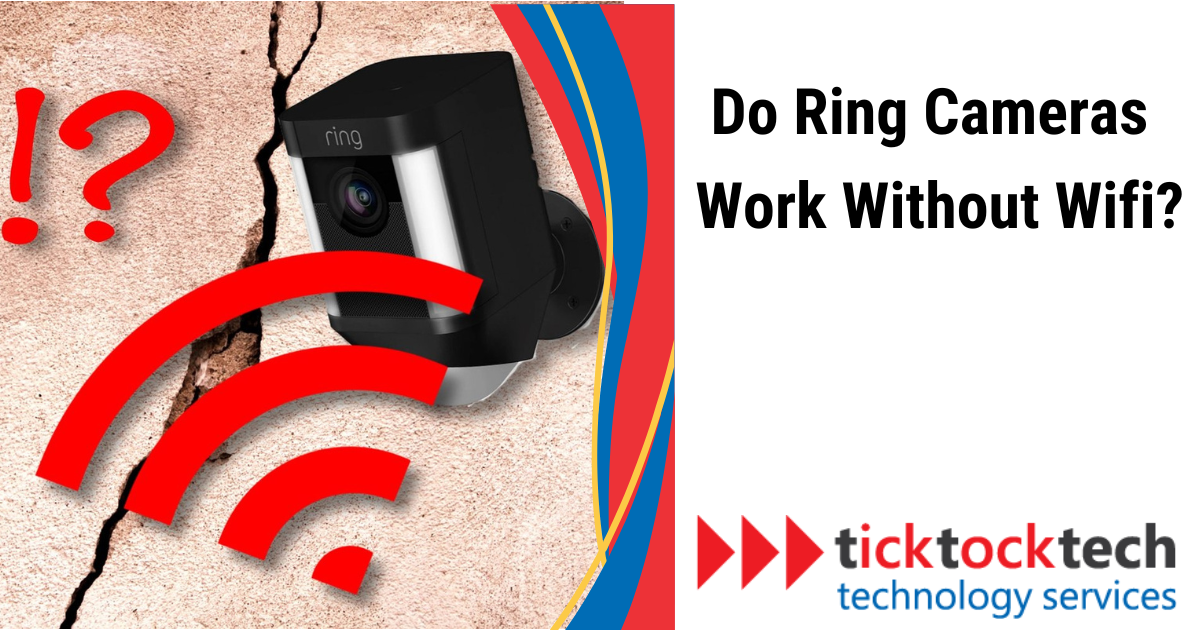Do Ring Cameras Work Without Wifi?
Most probably no. Ring cameras require a WiFi connection to fully function and transmit video to your device. Without WiFi, features such as live streaming and remote access are unavailable.
Ring cameras are designed to enhance home security and provide homeowners with peace of mind through real-time monitoring. These devices are part of a modern, interconnected ecosystem that relies on internet connectivity to offer various features, such as motion-triggered alerts, two-way audio communication, and cloud storage for video footage.
Installing a Ring camera involves a straightforward setup that connects to your home’s WiFi network, allowing you to access live video feeds and recorded clips from anywhere via the Ring app. While a Ring camera can still record events as they happen, without WiFi, you lose the ability to view those events in real time or receive instant notifications, significantly reducing the camera’s effectiveness as a proactive security tool.

Credit: wasserstein-home.com
Table of Contents
Ring Camera Basics: Understanding Connectivity Requirements
Ring cameras rely on Wi-Fi to fully operate, offering features like live video streaming and alerts. Without Wi-Fi, functionality is severely limited, impacting the device’s ability to communicate and perform effectively.
Ring cameras have rapidly become synonymous with home security, offering a sense of safeguarding that’s accessible and user-friendly. But a question often arises: do these nifty devices work without being tethered to the internet? Let’s delve into the essential connectivity requirements needed for Ring cameras to function effectively.
Ring cameras are designed to keep you connected to your home, no matter where you are. To accomplish this, they rely on a stable Wi-Fi connection. With a constant link to your wireless network, these cameras can stream video live, send alerts, and save footage to the cloud.
Without Wi-Fi, the functionality of your Ring camera diminishes significantly:
- Live streaming capability: The ability to view real-time footage directly from the Ring app.
- Instant alerts: Notifications sent to your phone when motion is detected or the doorbell is pressed.
- Cloud storage: All recorded videos are uploaded and stored on Ring’s secure servers for later access.
The Offline Scenario: What Ring Cameras Can Do Without Wi-fi
So, what happens when your Wi-Fi is down, or if you’re in a location with unreliable internet service? Ring cameras have limited functionality in these situations, but they’re not completely inoperative. Here’s what you can expect:
- Internal recording: Some Ring camera models come with a backup feature that allows recording on an internal memory.
- Motion detection: While real-time alerts are not possible, the camera’s sensors can still detect activity.
- Viewing saved footage: Depending on the specific model and settings, you might be able to view previously recorded videos until Wi-Fi connectivity is restored.
Ring cameras maximize their potential when they’re connected to Wi-Fi. Although they possess certain offline features, their capabilities are substantially reduced without a wireless connection. For peace of mind and full functionality, maintaining a robust Wi-Fi network for your Ring devices is crucial.
Offline Recording: Limited Functionality Without Wi-fi
Ring cameras require a Wi-Fi connection to fully operate, featuring limited offline recording capabilities. Without internet access, users may experience restricted functionality in monitoring and storing footage.
Ring cameras are typically known for their ability to provide security and peace of mind through live viewing and cloud storage. However, what happens when your Wi-Fi is down? Let’s delve into the details about how Ring cameras perform when they are offline.
The Necessity Of Wi-fi For Full Features
To harness the full potential of your Ring camera, Wi-Fi is essential. Without a stable internet connection, several key functions, such as live streaming and instant alerts, can’t be utilized. Here’s a more in-depth look at what you’re likely to miss out on:
- Live Video Streaming:
The ability to monitor your space in real-time is hampered; you can’t view live feeds, which is a primary feature of the Ring camera.
- Notifications and Alerts:
Immediate notification of any detected motion or ring alerts won’t be possible, potentially leaving you in the dark about activities around your premises.
- Access to Cloud Storage:
Without Wi-Fi, the camera cannot upload recorded footage to the cloud, which means you won’t have access to any video that was captured during the downtime once your Wi-Fi is back up.
- Two-Way Audio Communication:
The convenience of communicating with someone at your door through your Ring device will be unavailable without Wi-Fi.
Possibility Of Local Storage Alternative
Although limited, Ring does offer some functionality in the absence of Wi-Fi. When considering the adaptability of your Ring camera during an internet outage, keep in mind the following:
- Internal Backup Storage:
Some Ring models come with an option for local storage that can temporarily hold videos until the Wi-Fi connection is restored; this feature enables the camera to record events even if it’s offline.
- Manual Activation:
Certain Ring devices may allow manual recording or snapshot capture, giving you a chance to document important events manually, albeit with more effort and less convenience.
- Battery Operation:
Since Ring cameras can operate on battery power, lack of Wi-Fi doesn’t necessarily mean your camera will be completely non-functional; it will still retain some basic capabilities.
Embracing the limitations of your Ring device without Wi-Fi is essential for managing your expectations of home security during internet downtimes. Understanding these limitations ensures you’re better prepared for any network interruptions and can plan for alternative security measures if needed.
Remember that while some offline functionalities exist, to get the most out of your Ring camera, a steady Wi-Fi connection is non-negotiable.
Power Source Considerations For Ring Cameras
Ring Cameras require a stable Wi-Fi connection to fully function, as they rely on internet access for live streaming and remote viewing capabilities. While offline, certain features such as instant notifications and cloud storage will be unavailable.
Ring cameras have become essential tools in home security, offering real-time surveillance and peace of mind. An important aspect to understand is how they’re powered and how that relates to their functionality, particularly in situations where WiFi may not be available.
Power Source Flexibility For Ring Cameras
Ring cameras boast versatile power options, catering to diverse homeowner needs and installation scenarios. While WiFi is pivotal for features such as live streaming and alerts, power sources are independent of internet connectivity. Below, we unravel the power alternatives you can consider for your Ring device:
- Battery-powered models: These cameras come with rechargeable battery packs. They are perfect for locations without easy access to electrical wiring and can operate independently of WiFi for basic recording.
- Hardwired options: These cameras are directly connected to your home’s electrical system, ensuring uninterrupted power supply. Handy if you want a set-and-forget solution that doesn’t require frequent attention.
- Solar power attachments: A sustainable solution that works with certain models, solar panels can keep your Ring camera charged without the need to ever remove the battery.
Understanding Battery Life In The Absence Of Wifi
While your Ring camera may record without WiFi, understanding the impact on battery life is crucial. The state of connectivity can significantly influence how long your camera stays operational:
- Standby longevity: Without WiFi, a Ring camera conservatively uses power as it’s only recording based on motion triggers rather than streaming video.
- Feature limitations: Different features like Live View or two-way talk, which require WiFi, won’t drain the battery when you’re offline, extending battery life.
In essence, whether your Ring camera is plugged into the mains, running off a battery, or soaking up the sun’s rays, power sources play a pivotal role in the functionality and flexibility of these devices. Their ability to run without WiFi, albeit with limited capabilities, adds another layer to the security they offer homeowners.
Understanding these considerations helps to ensure that your home remains secure, regardless of whether your internet is up and running.
Alternative Connectivity Options For Ring Cameras
Ring cameras traditionally rely on a stable Wi-Fi connection, yet alternatives exist. Exploring Ethernet adapters or mobile data via a Wi-Fi hotspot can keep your Ring devices operational in the absence of traditional Wi-Fi, ensuring continuous monitoring and security.
Understanding Ring Cameras’ Dependency On Wifi
If you’re a Ring Camera user, you may wonder whether your device would function in the absence of WiFi. Ring Cameras are designed to rely heavily on a WiFi connection to transmit live video feeds, store footage on the cloud, and allow for remote access and notifications.
However, Ring does provide some alternatives to keep your security system operational, even if your WiFi goes down.
Exploring ways to keep your Ring Cameras connected is crucial, particularly when your internet service is disrupted. Let’s delve into some of the options available:
- Cellular Backup:
- With a Ring Protect subscription, certain Ring devices support cellular backup, which kicks in when your WiFi connection is lost, ensuring continued device functionality.
- Ethernet Connection:
- Some Ring devices offer Ethernet ports that allow for a wired connection to your network, providing a stable and reliable alternative to wireless connectivity.
- Local Storage Options:
- Although traditionally cloud-based, Ring has started integrating local storage options in some of their devices, enabling recording even without WiFi.
Remember that while these alternatives may provide backup solutions, they might come with limitations regarding the full spectrum of features that a stable WiFi connection offers.
Preparing For Connectivity Issues
It’s always best to be proactive about your home security. Here are some tips for maintaining camera functionality:
- Choose Devices Wisely:
- When selecting your Ring cameras, consider models that offer Ethernet ports or cellular backup capabilities to ensure a greater range of connectivity options.
- Regular Updates and Maintenance:
- Keep your Ring devices up to date with the latest firmware, and regularly check your internet and alternative connection equipment to preempt potential issues.
By considering these alternative connectivity options and preparing ahead, you can strive for uninterrupted surveillance, even in the face of connectivity challenges. Ensuring your Ring Cameras are equipped to handle network fluctuations not only protects your home but also provides the peace of mind that comes with a reliable security system.
Factors Influencing Ring Camera Performance Offline
Ring Cameras require a stable Wi-Fi connection for full functionality, including live streaming and accessing footage remotely. Without internet access, certain features may be limited, impacting the device’s overall performance and capabilities.
Ring cameras have become a staple in the realm of home security, providing peace of mind with their wide array of features. However, one question that often arises is whether these devices can function without a Wi-Fi connection. To clarify, Ring cameras are designed to rely on internet connectivity to offer their full functionality, yet certain aspects can still operate offline.
Let’s delve into the aspects that influence a Ring camera’s offline performance.
Battery Life And Power Source
Ring cameras can work without Wi-Fi for a limited period, but their operational efficiency hinges on their power source and battery life. Even without internet access:
- Battery Resilience: The battery life will determine how long the camera can continue recording. Without Wi-Fi, recordings aren’t uploaded to the cloud, but battery drain occurs as the device tries to reconnect to the network or continues motion detection.
- Power Conservation: Using a hardwired power source may provide a continuous supply of electricity, potentially lengthening the camera’s service duration in offline mode compared to battery-operated units.
Local Storage Capabilities
While a Wi-Fi outage may seem like a roadblock, your Ring camera’s local storage could be a saving grace. In the absence of cloud uploads:
- Internal Backup: Some Ring camera models feature internal storage that can temporarily keep recordings until a connection is re-established.
- Memory Card Slot: External memory options, such as a microSD card slot, will allow for the storage of footage directly on the device until you can transfer the data manually.
Motion Detection And Processing
A key trait of Ring cameras is their motion detection capability, which thankfully persists even sans Wi-Fi, albeit with twists:
- Continued Alerts: While offline, the camera might continue detecting motion and even record events, but it won’t send real-time alerts to your smartphone or save footage to the cloud.
- Post-Event Review: Once connectivity is restored, you might have access to the logs of the events detected during the downtime, offering a retrospective look at any activity that occurred.
Firmware And Software Updates
Lastly, the performance of Ring cameras, when disconnected from Wi-Fi, can be influenced by the firmware version installed on the device. Here’s how:
- Pre-Update Status: Ensuring your camera has the latest software before any Wi-Fi service interruption can guarantee smoother operation during offline periods.
- Enhanced Stability: Updated firmware often includes bug fixes and performance improvements that could reduce the impact of being disconnected from a network.
While Ring cameras show some resilience in offline scenarios, their capabilities are undeniably curtailed. Power source longevity, local storage features, and pre-emptive software updates play pivotal roles in ensuring that your Ring camera remains a watchful guardian, even when Wi-Fi takes a brief respite.

Credit: ticktocktech.com
Frequently Asked Questions On Do Ring Cameras Work Without Wifi
Does A Ring Camera Still Record Without Wi-fi?
A Ring camera cannot record without Wi-Fi as it requires an internet connection to upload and store videos.
How Can I Use My Ring Camera Without Wi-fi?
Ring cameras require Wi-Fi to function fully. Without Wi-Fi, live streaming, remote access, and notifications are unavailable. Local storage isn’t an option, limiting usage without an internet connection. Consider alternative cameras with offline capabilities for Wi-Fi-free operation.
Does Ring Work If Wi-fi Goes Out?
Ring devices require Wi-Fi to transmit live video and alerts. If Wi-Fi is down, these functions will not work, but the Ring Alarm system may still function with a cellular backup if subscribed to Ring Protect Plus.
Does Turning Off Wi-fi Disable Ring?
Turning off Wi-Fi will not disable your Ring device, but it will prevent it from connecting to the internet and sending live video feeds or notifications.
Conclusion
Understanding the functionality of Ring Cameras without WiFi is essential. While limited, operations like real-time video and notifications pause until connection resumes. For uninterrupted security, a stable WiFi network is paramount. Prioritize connectivity to ensure your Ring device performs optimally, safeguarding your home effectively.






0 Comments